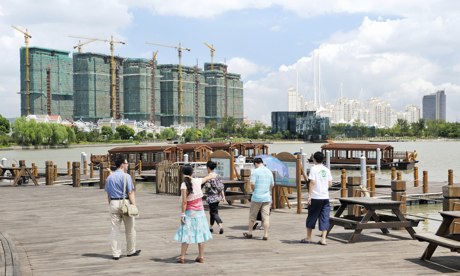China's growth and manufacturing output decline as property prices soar
01-02-2014
China's growth and manufacturing output decline as property prices soar
Data comes after studies showing real estate prices rising and detailing the mounting debts of local authorities
Phillip Inman, economics correspondent
The Guardian

Luxury houses and apartments in Songjiang: property prices are soaring in China as demand for new housing appears insatiable. Photograph: Alamy
Chinese manufacturing activity declined in December, piling pressure on communist leaders grappling with the slowest economic growth in the country since 1999, amid booming property prices and rising local government debts.
An industry group, the China Federation of Logistics & Purchasing, said on Wednesday that its purchasing managers index for December declined to 51 from the previous month's 51.4, where numbers above 50 indicate increasing activity.
The group's spokesman, Zhang Lijun, blamed a decline in exports for much of the slowdown and lacklustre demand from domestic buyers. "There still is downward pressure on economic growth," he said.
The figures follow surveys showing property prices rising in December and a report highlighting the mounting debts of local authorities.
Prices of new homes in 288 cities in December had climbed 10.04% from a year earlier, little changed from November's annual rise of 10.11% and a seventh consecutive month of double-digit annual gain, according to a poll by property services firm E-House China.
Property prices have become a running sore in Chinese society with many priced out of the market and forced to pay high rents. The government has sought to boost affordable housebuilding and construct bus and train links to new developments, but demand has continued to outstrip supply. Meanwhile, much of the burden of funding housing projects has fallen on local authorities, which have seen their debts rocket to almost $3tn (£2.2bn), according to China's National Audit Office, underlining fears that thousands of local councils and state-owned businesses in the world's second biggest economy have over-stretched themselves and are close to collapse. Communist leaders have sought to boost growth in the short term with additional investment in infrastructure while embarking on long-term reforms to overhaul the debt-laden public sector, bring more competition to traditionally state-run markets and encourage consumer spending.
This week, the ruling party announced the formation of a body led by President Xi Jinping to oversee regulatory changes.
Economic growth declined to a two-decade low of 7.5% in the three months ending in June. It rebounded to 7.8% the following quarter but private sector analysts say that recovery is likely to fade. The government said last week that for the full year, the economy probably grew 7.6%, which would be its weakest performance since 1999.
The logistics federation said the export component of its index declined 0.8 points to 49.8. Production expanded but the activity indicator weakened by 0.6 points to 52.
An unexpectedly sharp decline in global demand for Chinese exports in 2012 and early last year prompted Beijing to reverse course temporarily and launch a mini-stimulus of higher spending on railway construction.
The country's top economic official, Premier Li Keqiang, has warned that the stimulus will have little effect and improvements will have to come from longer-term reforms. Consumer spending has grown steadily in recent years, but Chinese families still save a significant share of their income as an insurance policy against ill health and loss of work. Despite being a communist state, the costs of healthcare provision are high and welfare support is low.
The ruling party's reform blueprint last month promised China's more dynamic entrepreneurs a bigger role but said state industry would remain the core of the economy, a move some analysts warn could drag on growth.

